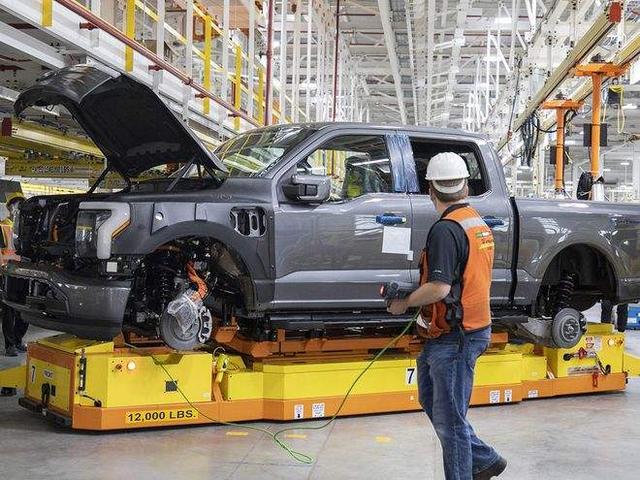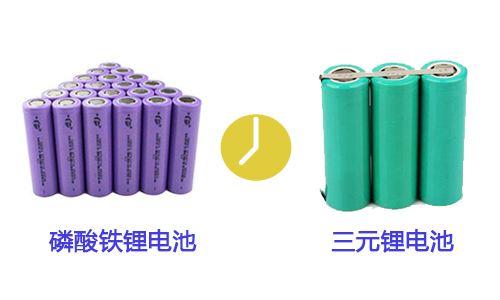After Tesla and then by Ford, lithium iron phosphate battery overtakes ternary lithium battery
Ternary lithium batteries (NCM/NCA) and lithium iron phosphate (LFP) are the two most mainstream technologies in the field of electric vehicle power batteries at this stage. In the first quarter of 2022, the installed base of LiFePO4 has overtaken that of
LiFePO4 and its market share is gradually increasing.
Following Tesla's announcement of lithium iron phosphate batteries in entry-level models such as the Model 3 and Moderl Y, another US car company, Ford, plans to launch electric vehicle models equipped with lithium iron phosphate batteries.
Ford CEO Jim Farley (Jim Farley) said in a recent earnings call that Ford has made some technical accumulation of lithium iron phosphate batteries, and in the future plans to carry lithium iron phosphate batteries on two low-cost entry-level models, the
all-electric SUV Mustang Mach-E and the all-electric pickup truck F-150 Lightning, but has not yet revealed the specific launch timing and further details.
"We have been working on lithium iron phosphate batteries for a long time, and the implementation of a lithium iron phosphate solution in Ford's first generation of pure electric models is a tremendous opportunity to rapidly increase production." Farley
said at the conference.

With Ford projecting annual production of 150,000 F-150 Lightning models in the US by 2023, compared to 50,000 Mustang Mach-E models in Mexico in 2021, such a significant capacity ramp-up plan is no small challenge for Ford.
The move to lithium iron phosphate batteries will not only keep the price of entry-level models attractive in the face of rising raw material prices, but also better allocate lithium triplet production to high-end long-range models, thereby alleviating the
supply pressure caused by the shortage of lithium triplet batteries and further expanding the overall capacity of electric models.
Foreign media said that in addition to the confirmed Mustang Mach-E and F-150 Lightning, Ford may also be equipped with lithium iron phosphate batteries in the all-electric commercial van E-Transit.

Lithium iron phosphate battery, is a lithium-ion battery using lithium iron phosphate (LiFePO4) as the cathode material, carbon as the negative electrode material. Compared to ternary lithium batteries, LiFePO4 is safer and more stable, has a longer cycle
life and is only slightly inferior in terms of energy density and range.
Ternary lithium battery cathode contains nickel, cobalt and manganese "ternary precursor", so the battery energy density has performance advantages at the same time, subject to the impact of rising prices of key materials is also greater. Lithium iron
phosphate batteries do not contain nickel and cobalt, the supply of raw materials is more stable, and has a stronger cost advantage than ternary lithium batteries.
In addition, the two batteries differ in their charge and discharge performance. Tesla CEO Musk has publicly stated that Tesla models equipped with lithium iron phosphate batteries can be charged to 100%, while models equipped with ternary lithium
batteries need to consider their cycle life and are recommended to be charged to 90% only.
Global electric vehicle leader Tesla was the first car company to adopt LiFePO4 on a large scale, with nearly 50% of the company's electric cars produced in the first quarter of 2022 using LiFePO4. In addition to Tesla and Ford, a number of other electric
vehicle manufacturers have also added lithium iron phosphate versions to some of their models. Rivian previously announced lithium iron phosphate versions of its R1T pickup, R1S SUV and EDV van, and companies such as Volkswagen Group and
Xiaopeng Automotive are also advancing battery models with lithium iron phosphate.
Tesla CEO Musk analysis: "In the long term, because lithium iron phosphate batteries do not contain nickel and cobalt elements, so the scale of the use of this battery may exceed that of ternary lithium batteries. In the power battery market share, in the
future, lithium iron phosphate batteries will account for roughly two-thirds, and ternary lithium batteries or other similar elements of power batteries account for one-third. In fact, this ratio is very appropriate because there are a lot of iron resources in
the world, and there are relatively few nickel and cobalt resources."
According to the CCA data, in April this year, China's power battery production was 29.0 GWh, of which ternary batteries produced 10.3 GWh, accounting for 35.5% of total output, and lithium iron phosphate batteries produced 18.6 GWh, accounting for 64.3% of total output. In the same month, the installed base of power batteries in China was 13.3GWh, of which 4.4GWh were ternary batteries, accounting for 32.9% of the total installed base, down 15.6% year-on-year, and 8.9GWh were lithium iron phosphate batteries, accounting for 67.0% of the total installed base, up 177.2% year-on-year.
According to the Starting Point Research Institute (SPIR), global shipments of lithium iron phosphate batteries are expected to reach 480.1 GWh by 2025. in the future, China is expected to become the largest output country of lithium iron phosphate batteries. The world's largest supplier of lithium iron phosphate batteries is China's leading power battery Ningde Time (300750), and six of the world's top ten power battery companies are from China.
It is worth noting that another Chinese power battery giant BYD (002594) with 4.19GWh of installed capacity overtake Ningde Time to become the first domestic lithium iron phosphate power battery companies in April. BYD's "blade battery" launched in March 2020 uses lithium iron phosphate technology, and through structural innovation to improve battery volume utilization by more than 50%, reaching the same level of high energy density ternary lithium batteries .
BYD is currently the only Chinese battery supplier for the Ford Mustang mach-E, which is powered by a ternary high nickel 811 battery manufactured at BYD's Xi'an plant. The relationship between the two companies for the Mustang mach-E suggests that Ford may use BYD's "blade battery" as part of its LiFePO4 solution in the future.





























 401,Building A1,No.168,Changshan IndustrialZone Liulian Community,Pingdi Street,Shenzhen Guangdong Province,China
401,Building A1,No.168,Changshan IndustrialZone Liulian Community,Pingdi Street,Shenzhen Guangdong Province,China